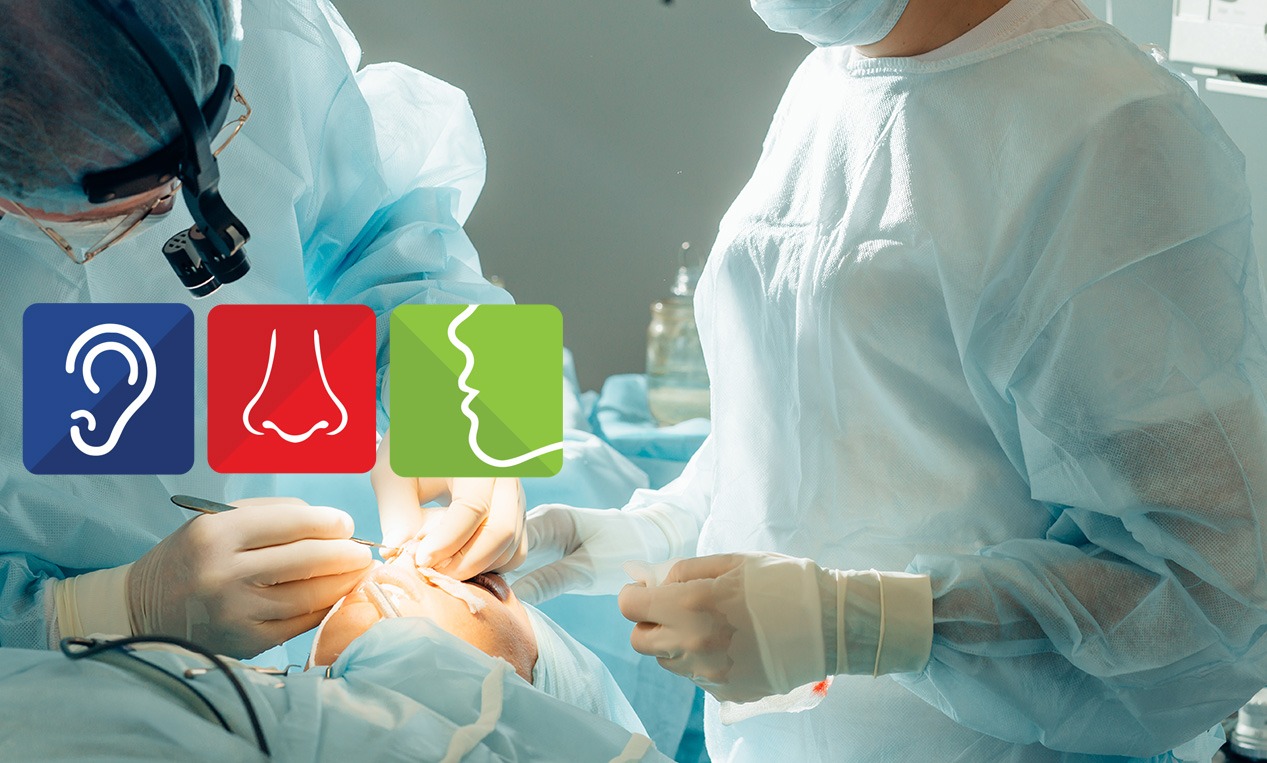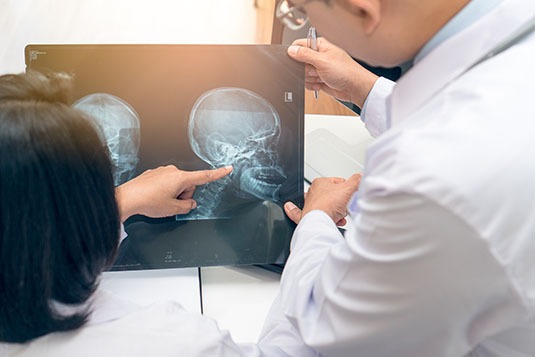ENT Head and Neck Surgery
Otolaryngology, Head and Neck Surgery relates to the treatment of the ear, nose and throat, along with the head and neck area in general. Head and neck cancer can originate from a number of sites, including:
- Skin
- Oral cavity (tongue, hard palate, floor of mouth)
- Pharynx (tonsils, base of the tongue, soft palate)
- Larynx, or ‘voice box’
- Salivary glands (parotid, submandibular and sublingual glands)
- Thyroid and parathyroid glands
- Sinuses
- Nasal cavity
- Skull base
There may be different benign and malignant tumours occurring throughout these areas.
Head and neck cancer diagnosis
Early diagnosis and treatment are critical to improving survival rates and the quality of life for patients.
Some of the symptoms of head and neck cancer include:
- Sore throat
- Problems with swallowing
- Difficulty with breathing
- Pain or lumps in the head and neck area
- Voice change or hoarse voice that does not improve over time
- Persistent tongue ulcers that do not heal
- Coughing up blood or blood in the saliva
- Ongoing ear pain with no cause found
- Numbness or pain in the face
- Nose bleeds
- Weakness of the face or facial droop
- Night sweats and loss of weight
Smoking and alcohol use are responsible for over 50% of head and neck cancers.
If you notice any of these symptoms, the first step is to visit your GP. They should examine the area and refer you to a specialist for further investigation if needed. Dentists may also notice symptoms during a dental examination and refer you for tests.
Head and neck examination
A thorough head and neck examination not only requires palpation of the neck and the lump, but also involves specific examinations related to nearby structures that may be affected (such as cranial nerves that perform certain functions, for example).
In the case of a metastatic lymph node in the neck, a primary site where the cancer originated needs to be identified.
Otolaryngology Head and neck surgeons conduct the following investigations:
- Physical examination of the head and neck, nose, mouth, throat and ears
- Flexible nasendoscopy, which involves passing a fine diameter flexible fibre-optic scope through the nose and into the throat to see the larynx or voice box. This is minimally invasive, quick and well tolerated by everyone from children right through to the elderly
- Sometimes the surgeon may perform an ultrasound
- Depending on your symptoms, a biopsy or tissue sampling
Neck Lumps
Lumps in the neck are common and are referred to ENT surgeons. They can be congenital, as a result of infection, autoimmune-related, or sometimes a tumour or cancer.
The management of neck lumps depends on the history and examination of the patient. Specific tests can then investigate and help diagnose the condition.
A thorough history is often the most important part in evaluating a person with a neck lump, and focuses on the lump and also related risk factors (such as smoking, alcohol, history of skin cancers), and symptoms that are specifically related to the head and neck (such as sore throat, swallowing problems, voice change).
Ultrasound of neck lump
In almost every neck lump investigation an ultrasound-guided fine-needle aspiration (FNA) of the lump is required and is best performed by a head and neck surgeon.
Medical tests such as blood tests, ultrasound, CT, MRI or PET scans may be ordered.
The oropharynx includes the tonsil and the base of the tongue. A diagnosis of ‘branchial cyst,’ a benign congenital neck lump, needs to be made carefully in the current epidemic of viral related/HPV positive squamous cell carcinoma. These patients are often younger, non-smokers and non-drinkers.
Increasingly, patients are misdiagnosed with a ‘branchial cyst’ when they actually have cancer that has spread from a primary tumour that first began in the base of the tongue or the tonsil. These cancers can be very small. Cases of oropharyngeal cancer are treated with radiotherapy or may be appropriate for Trans-Oral Robotic Surgery (TORS).
Dr Sam Flatman – Head and Neck Cancer Surgeon
Dr Sam Flatman has a sub specialisation in head and neck surgical oncology and offers unique expertise in cancers of the head, neck, mouth and throat, including thyroid cancer, advanced skin cancer and salivary gland tumours.
Dr Sam introduced surgeon-performed ultrasound to the head and neck unit at Peter MacCallum Cancer Centre, which allows patients to undergo diagnostic ultrasound and ultrasound-guided fine-needle biopsy by the treating surgeon at the same time as their clinic appointment; decreasing the number of appointments and streamlining care for patients.
He also performs Trans-Oral Robotic Surgery (TORS), particularly for cancers of the tonsil and the base of tongue. TORS enables the surgeon to perform more precise movements during surgery, with superior access and results in faster recovery and fewer complications than the traditional operations these tumours once required. It can also mean that radiation therapy is not required as part of treatment for these cancers, reducing long term side effects and treatment duration.
Dr Tim Baker – Head and Neck Cancer Surgeon
Dr Tim Baker is appointed as a senior consultant surgeon at St Vincent’s Public Hospital where he continues to train registrars and perform surgery on advanced head and neck cancers in a multidisciplinary environment.
Dr Tim offers expertise in the management and reconstruction of numerous head and neck diseases utilising conventional and cutting edge techniques such as trans oral laser surgery.
Tertiary Care Referral Centres
Surgeons who treat cancer are one important part of a much larger multidisciplinary team that include other medical specialists and allied health. A multidisciplinary team is a group of health professionals who specialise in different aspects of your care and treatment.
Tertiary referral centres that specialise in head and neck cancer are the gold standard for management of these patients. Studies show better treatment and better outcomes for people when they are linked up and treated through these centres.
Choosing the right team for your care
The head and neck is unique. It involves many special senses such as sight, smell, taste, speech and swallow. It is at the forefront of a person’s appearance and is at the core of who we are. It is integral to how we appear, and relate to, our loved ones and the rest of the world.
The treatment for head and neck cancer has to take into account all of these incredibly special features. It should be undertaken by fellowship-trained head and neck cancer surgeons with significant experience.


